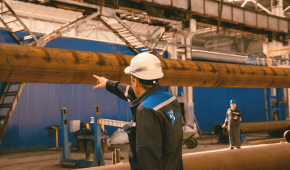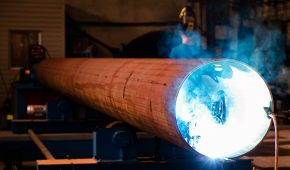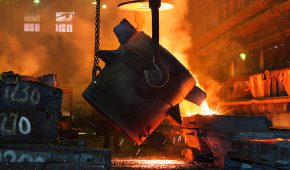Civil engineering and hydro-engineering are special areas of construction. They include the construction of objects and structures that must be prepared for heavy loads and which are technically more advanced than traditional buildings. Tunnels, viaducts, bridges, underground car parks or harbour structures are just examples of works of engineering and hydro-engineering construction. In conjunction with a well-thought-out design, robust materials are needed here to ensure durability and safe use. The most important are, among others, steel pipes.
Steel pipes for drilling and jacking
Drilling and jacking are modern trenchless methods that make it possible to create an underground installation without destroying the above-ground infrastructure located on the site. This allows for significant savings and shortening the duration of work, and does not create inconvenience, because there is no need to temporarily close roads and other facilities under which the installation is to be carried out.
Drilling or jacking is not possible without steel pipes or pipes made of polyethylene. The pipes used for this purpose can have different diameters. The methods of introducing them into the substrate may also be different.
Tubular struts
In engineering and hydro-engineering construction, so-called diaphragm walls are sometimes built. Their task is to carry the load. Diaphragm walls can act as deep foundations, water barriers in dams or retaining walls of deep excavations. The individual sections of diaphragm walls are usually separated by steel pipes. These can be both seamed pipes, as well asstructural pipes of different diameters.
The steel pipe placed between the sections is a kind of strut that ensures the stability of the structure. Usually, such a pipe is mounted on the top of the wall, after concreting the anchoring element, which is steel brands. In some cases, instead of steel pipes, flat distribution elements equipped with gaskets are used as a strut.
Steel piles
Flyovers supports, breakwaters, piers or waterfront foundations are examples of structures for the construction of which piles made of steel pipes are used. Steel piles are also used for the construction of infrastructure facilities, erected in difficult terrain conditions or for the temporary creation of scaffolding, formwork or detour bridges.
As steel piles, pipes with an open bottom are most often used, the diameter of which is 400-700 mm. However, some constructions require the use of pipes with a diameter of up to 2500 mm or the use of a complex cross-section, i.e. pipes with welded sections. As a rule, steel piles are divided into large-diameter and small-diameter piles. Large-diameter piles are intended mainly for hydro-technical and geotechnical structures, such as bridges or tunnels. They will also work well in creating combined walls and roads. In turn, small-diameter piles are used primarily to strengthen foundations or in the case of erecting buildings on boggy ground.
Steel piles are mounted by hammering, pressing or vibrating into the ground. Then, to increase their stabilization, they are often filled with aggregate or concreted. Sometimes they are also closed with a steel blade.
What characterizes steel piles is their high load capacity and resistance to bending and torsional forces. Structures are not always built of individual piles. Sometimes it is a pile assembly, i.e. structures referred to as combined walls and pile walls.
Casing pipes
Many underground installations need additional protection against the harsh conditions that prevail under the ground. Such protection is provided by casing pipes. This is a type of steel pipe that is mounted on fibre optic cables, telecommunications or low voltage cables. It also happens that casing pipes protect the pipes inside buildings and in open areas.
Casing pipes are divided longitudinally so that their assembly is easy, fast and possible to perform on a working installation. They can have different diameters and are usually covered with a layer of zinc that provides anti-corrosive properties.
The Eco-Tech steel warehouse offers steel pipes which are perfect for use in various types of projects in the field of engineering and hydroengineering. We guarantee high quality and a wide selection of pipes from respected domestic and foreign manufacturers.




